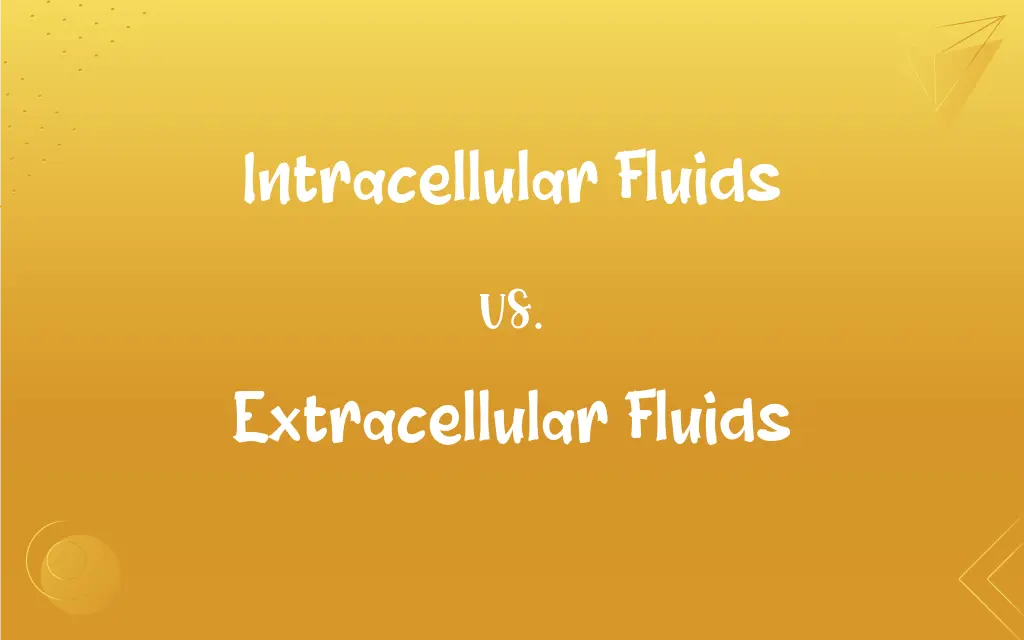Intracellular Fluids vs. Extracellular Fluids: What's the Difference?
Edited by Aimie Carlson || By Harlon Moss || Updated on October 13, 2023
Intracellular fluids are liquids within cells, facilitating internal processes, while extracellular fluids surround cells, aiding nutrient transport, waste removal, and intercellular communication.

Key Differences
Intracellular fluids (ICF) serve primarily within the cells, offering a medium through which cellular processes take place. In contrast, extracellular fluids (ECF) provide an external environment that facilitates the transport of materials to and from cells, being a crucial element in the interchange of nutrients and waste between the cellular environment and the external milieu.
Intracellular fluids constitute about two-thirds of the total body water in humans, ensuring that cellular metabolism, enzymatic activity, and other intracellular processes occur efficiently. Extracellular fluids, conversely, are not confined within cellular boundaries, enveloping cells with a fluid that is vital for the conveyance of messages, nutrients, and substances between different cell types and tissues.
Intracellular fluids hold various solutes, like electrolytes, that are pivotal for maintaining cellular osmolarity and ensuring cell survival and function. Oppositely, extracellular fluids contain a distinct composition, housing different concentrations of electrolytes and solutes, ensuring the osmotic balance and stable environment needed for cells to function appropriately.
Intracellular fluids are predominantly contained and isolated within a cellular membrane, restricting direct interaction with external environments. On the other hand, extracellular fluids directly interact with cells, playing a significant role in processes like cellular hydration, nutrient delivery, and waste expulsion, impacting cellular health and functionality.
In instances where intracellular fluids experience imbalance or disruption, cellular functions, including metabolism and synthesis activities, are impacted. Conversely, disruptions or alterations in extracellular fluids can impact numerous cells simultaneously, affecting tissue health, communication, and overall organ functionality, demonstrating the comprehensive role of ECF in systemic physiological stability.
ADVERTISEMENT
Comparison Chart
Location
Within cell membranes
Outside cell membranes
Function
Facilitates intracellular processes
Mediates intercellular communication and transport
Volume in Human Body
Approximately 2/3
Approximately 1/3
Electrolyte Composition
High in potassium and phosphate
High in sodium and chloride
Interaction with Cells
Limited to inside individual cells
Interacts with and affects multiple cells and tissues
ADVERTISEMENT
Intracellular Fluids and Extracellular Fluids Definitions
Intracellular Fluids
Intracellular fluids remain segregated from the external cellular environment.
Intracellular fluids are separated from extracellular counterparts by the cellular membrane.
Extracellular Fluids
Extracellular fluids contain distinct electrolyte concentrations, differing from intracellular fluids.
Sodium is found in higher concentrations in extracellular fluids compared to intracellular fluids.
Intracellular Fluids
Intracellular fluids contribute to maintaining cell volume and shape.
In the absence of adequate intracellular fluids, cells may become dehydrated and lose their functionality.
Extracellular Fluids
Extracellular fluids provide a medium for cell-to-cell communication.
Hormones travel through extracellular fluids to reach target cells.
Intracellular Fluids
Intracellular fluids are involved in intracellular signal transduction.
The movement of calcium ions within intracellular fluids can trigger various cellular responses.
Extracellular Fluids
Extracellular fluids are liquids located outside of the cells.
Extracellular fluids facilitate the transport of nutrients towards the cells.
Intracellular Fluids
Intracellular fluids are the liquids found inside cells.
Intracellular fluids provide the medium for enzymatic activities within the cell.
Extracellular Fluids
Extracellular fluids assist in the removal of waste products from cells.
The metabolic waste is transported by extracellular fluids to excretion organs.
Intracellular Fluids
Intracellular fluids contain solutes essential for cellular processes.
A balance of different electrolytes in the intracellular fluids ensures cellular osmotic stability.
Extracellular Fluids
Extracellular fluids play a vital role in maintaining the osmotic balance and homeostasis within an organism.
The composition of extracellular fluids directly impacts cellular hydration and functionality.
FAQs
How do intracellular and extracellular fluids interact?
They maintain a dynamic balance, with substances constantly exchanged to maintain cell health and functionality.
What is intracellular fluid?
It is the fluid located inside the cells, facilitating internal cellular processes.
Which has a higher potassium concentration, intracellular or extracellular fluid?
Intracellular fluid typically has a higher potassium concentration.
What role does extracellular fluid play?
It facilitates transport of nutrients, waste removal, and intercellular communication.
How does the composition of extracellular fluids affect cells?
It influences cell hydration, nutrient supply, and waste removal, impacting cellular health and communication.
What could happen if intracellular fluids are imbalanced?
It may impact cellular metabolism, enzymatic function, and even lead to cell death.
How do substances move between intra- and extracellular fluids?
Via mechanisms like diffusion, osmosis, and active transport across the cell membrane.
How do cells protect themselves from detrimental changes in extracellular fluids?
Through regulatory mechanisms that adjust internal conditions to maintain cellular stability.
Why is electrolyte balance important in intracellular fluids?
It ensures cellular stability, promotes metabolic activities, and supports enzymatic functions.
What is the significance of extracellular fluids in cellular communication?
They transport signaling molecules, like hormones and neurotransmitters, between cells.
How is volume maintained between intra- and extracellular fluids?
Through osmoregulation mechanisms and ion transporters, maintaining osmotic balance.
Can abnormalities in intracellular fluids affect cellular energy production?
Yes, imbalances can disrupt metabolic processes, impacting energy production and cellular activities.
Can intracellular fluids influence cellular genetic activities?
Yes, they can impact gene expression and DNA replication by influencing the cellular environment.
How is the immune response related to extracellular fluids?
Immune cells and signaling molecules utilize extracellular fluids for transport and communication.
Do intracellular and extracellular fluids have the same osmotic pressure?
Generally, they are in osmotic equilibrium, but have different constituent solutes and particles.
Are extracellular fluids singularly composed?
No, it comprises various sub-compartments like interstitial fluid, plasma, and more, each with unique compositions.
What is the function of intracellular fluid in cellular metabolism?
It provides a medium for metabolic reactions and transport of metabolic substrates within the cell.
How do cells regulate extracellular fluid composition?
Through selective transport mechanisms, adjusting ion concentrations and removing wastes.
Is the pH level important in intracellular fluids?
Yes, it influences enzymatic activities and metabolic reactions within cells.
How do changes in extracellular fluids impact blood pressure?
Fluctuations in volume or osmolarity can influence blood vessel constriction and pressure.
About Author
Written by
Harlon MossHarlon is a seasoned quality moderator and accomplished content writer for Difference Wiki. An alumnus of the prestigious University of California, he earned his degree in Computer Science. Leveraging his academic background, Harlon brings a meticulous and informed perspective to his work, ensuring content accuracy and excellence.
Edited by
Aimie CarlsonAimie Carlson, holding a master's degree in English literature, is a fervent English language enthusiast. She lends her writing talents to Difference Wiki, a prominent website that specializes in comparisons, offering readers insightful analyses that both captivate and inform.































































